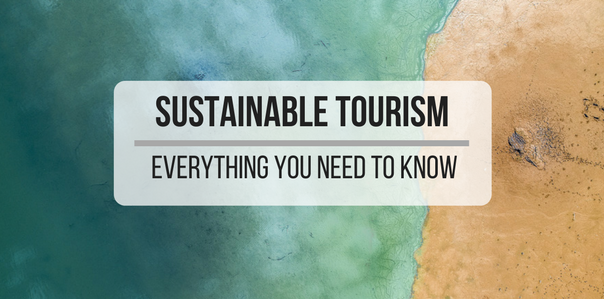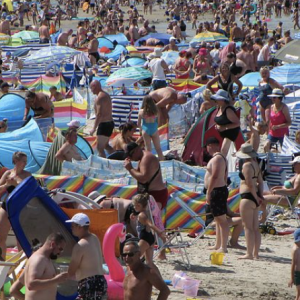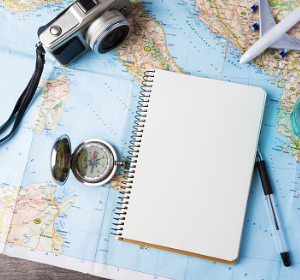
Escaping away with the family for a holiday is important. It’s our chance to wind down, get away from the hustle and bustle of daily life and forget work. The problem is that many of us leave a large holiday footprint, rarely giving a thought to the impact we leave behind on the environment and local culture.
We aren’t saying don’t go on holiday. We understand that your yearly getaway is one of the most important dates in your calendar. No, we’re asking that you give a little thought and do a little planning to help reduce your holiday footprint... and we’ll help by offering some eco-friendly ways to travel.
Below we have offered up a few things you can do to reduce your impact to help guarantee that you can enjoy your holiday travelling green.
How are holidays impacting the environment?
Before we jump into offering out some advice, it’s important that we look at how holidays can impact landscapes, cultures, wildlife, and the environment.
Travel can impact the environment in many ways, from influencing social change to seriously damaging local businesses. There are, however, three more specific influences that are discussed most in relation to the effects on the world we live in.

Air Pollution
The most talked about environmental issue brought about by travel and tourism is of course, air pollution. When we choose to travel to hotter climates we have a serious impact on the environment. In fact, the largest portion of air travel that contributes to emissions (60%) is tourists travelling to one destination to another.

Water Resources
The scarcity of water is becoming a real issue in some parts of the globe. Areas that rely heavily on tourism are beginning to see the real impact of their reliance on the water resources within their area. From golf courses to swimming pools – water use and wastage is a real issue that requires addressing.
Land Degredation

Tourism is a vital part of many local economies the world over, but to facilitate tourism, a local infrastructure needs to be in place. Car parks, hotels, holiday attractions – all have to be created to entice and accommodate holiday makers. This contributes to land degradation. It can strain both the local landscape and natural resources. One resource that sees perhaps the most impact is forest areas. They are often cleared to make way for new hotel complexes and amusement parks, often having a serious impact on the environment.
What can you do to help?
Now we have briefly looked at the ways in which our holiday making is damaging the environment, we’re sure you’re asking, ‘how can I be eco-friendly while on holiday?’
There are many things that you can do while travelling to protect local environments and cultures and below we’ve listed some of the best eco-friendly travel tips.
Renting a car?

Running car engines release several types of gasses, all of which are detrimental to the environment. We recommend using public transport rather than renting a car when possible. But if you must rent a vehicle, remember this:
55 MPH is the idea speed for fuel efficiency. Fluctuating speed can use more fuel, so if you’re on a highway, keep your eyes on your speed! Avoid idling, too. Doing so can use up to half a gallon of fuel per hour.
Eat like the locals do

The beauty of the villas advertised here at Panoramic is that they all have fully fitted kitchens and cooking facilities. That means that you don’t always have to head out to local restaurants to eat. Instead, pop to the supermarket, stock up on local produce and whip together your own meals at home, saving both the environment and your money.
Villa life

Staying in one of our villas? You probably want to blast that state-of-the-art air con all the time. Don’t do it. Employ all the things you do at home to help the environment. Don’t need the lights on? Turn them off. Don’t run the tap while brushing your teeth. When you’re heading out, turn off all of the appliances. 22% of waste generated by overnight guests at hotels & villas is plastic, cardboard, and paper. Cut down your waste by taking your own drinks bottles, toiletries, and containers.

Life's a beach
One of the joys of strolling down a beach, sandals in hand is collecting the colourful & different seashells you find along the way. But did you know that this adversely impacts the environment, too? One beach in Spain even saw a 60% decrease in sea shells from 1978 to 2010 as a result of tourists collecting them. Crabs often use sea shells to protect themselves, birds use them to build nests – they’re an important part of the eco-system, so think twice next time you think about picking one up.
In 2016, 888,589 food wrappers were collected as part of a global food effort. If you’re heading for a beach picnic make sure you take a bag to collect your rubbish... it’s the very least you can do.
Go local

We’ve mentioned eating local produce, but why not consider further investing in the local economy? Many shops sell locally made souvenirs rather than imported goods, which will help keep local industry alive and provide you with a genuine token of your trip.
We recommend learning at least some of the local lingo before flying out. It’ll make communicating a whole lot easier and you’ll find that local people are much more willing to help you get around if you have spent some time trying to learn their language.
Be responsible

The main takeaway to remember is to just act responsibly. In most instances being environmentally friendly while travelling isn’t hard. It just requires you to think twice before dropping that food wrapper, renting a car, and leaving your villa. And these small steps will help save our planet. If each and every one of us does the above at home and away we can reduce our massive footprints.
Environmental Charities
If cutting back on using water abroad and not renting a car doesn’t quite cut it for you, there are tonnes of charities out there working hard to conserve our planet. You can check out a handful of our favourites below:

Through science, policy, and partnerships with countries all over the world, Conservation International help support and protect over 601 million hectares of land, marine, and coastal areas.

The drive behind NRDC is to ‘safeguard earth – its people, its plants and animals, and the natural systems on which all life depends. They do this by combining the power of two million online members and activists, scientists, lawyers, and policy advocates throughout the world.

Many holiday destinations rely on their beach views and seafront attractions. Ocean Conservancy are dedicated to ‘developing innovative solutions to save our ocean’.

The overall aim of Greenpeace is ‘a green and peaceful world – an earth that is ecologically healthy and able to nurture life in all its diversity’. They work to help our ecosystem, and that involves everything from our forests, oceans, climates, and cultures.

We couldn’t create this list without mentioning a holiday specific initiative. Make Holidays Greener support travel and hotels & accommodation encourage and achieve greener tourism.




